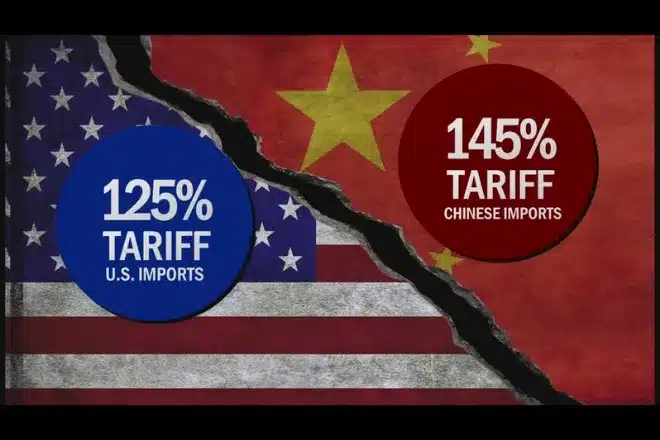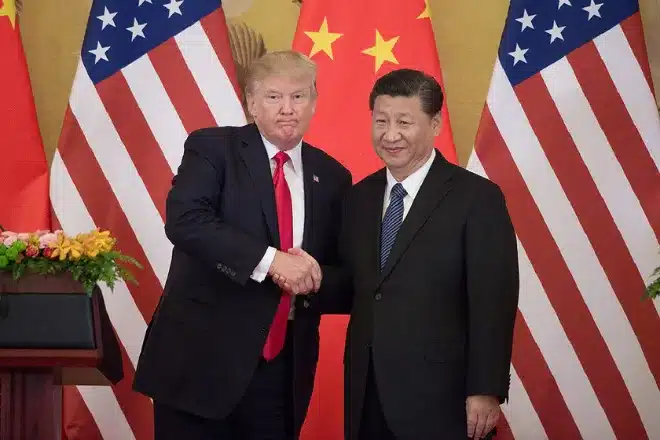U.S. President Donald Trump reiterated his call for a “fair deal” on trade with China on Wednesday, signaling openness to negotiation while acknowledging uncertainty about how and when the ongoing tariff standoff with Beijing could ease. Despite this optimistic tone, key U.S. officials offered few specifics on how Washington intends to move forward in resolving its intensifying trade war with the world’s second-largest economy.
Contents
- 1 Trump Hints at Active Talks but Links Progress to Beijing
- 2 Rising Tensions and Record Tariffs on Both Sides
- 3 Treasury Secretary: “Not Yet” Time for Tariff Talks
- 4 Top-Level Ties May Not Lead Talks
- 5 Potential Exemptions and Industry Impact
- 6 Broader Trade Strategy and Economic Warnings
- 7 Outlook: No Clear Path Yet, But Hopes for Dialogue Persist
- 8 About H2T Finance
Trump Hints at Active Talks but Links Progress to Beijing
Speaking from the Oval Office, President Trump emphasized the possibility of reaching a mutually beneficial agreement with China. “We’ll have a fair deal with China,” Trump told reporters. “Everything’s active,” he added when pressed about ongoing discussions with Beijing.
However, Trump noted that the timeline for easing tariffs “depends on them,” referring to Chinese authorities. While expressing confidence in his relationship with Chinese President Xi Jinping, Trump did not provide a clear roadmap for de-escalation.
Rising Tensions and Record Tariffs on Both Sides
Tensions between the U.S. and China have escalated sharply in 2025. The Trump administration recently imposed an additional 145% tariff on a range of Chinese imports, citing unfair trade practices and national security concerns. In response, Beijing retaliated with 125% tariffs on American goods, deepening the trade rift.
Despite the high-stakes tit-for-tat, Washington appears to be positioning itself for potential compromise. Yet, clarity on next steps remains elusive.

Treasury Secretary: “Not Yet” Time for Tariff Talks
U.S. Treasury Secretary Scott Bessent offered a more cautious view, suggesting that substantive negotiations are not yet underway. Speaking during the International Monetary Fund and World Bank spring meetings, Bessent said, “I think both sides are waiting to speak to the other.”
He dismissed the idea of a unilateral tariff rollback by the U.S. and emphasized the need for mutual de-escalation. “I don’t think either side believes that the current tariff levels are sustainable,” Bessent remarked at the Institute of International Finance forum. “This is the equivalent of an embargo, and a break in trade between the two countries benefits no one.”
Top-Level Ties May Not Lead Talks
While Trump often touts his personal rapport with Xi Jinping, Bessent cautioned against assuming that any de-escalation would begin at the top. “It’s both a blessing and a curse that the strongest relationship is at the very top,” he said. “But any talks won’t start there.”

Potential Exemptions and Industry Impact
President Trump has shown a willingness to offer limited exemptions from tariffs. Recently, his administration granted temporary relief for certain tech-related imports, including smartphones and semiconductor manufacturing equipment. According to a Financial Times report, Trump is also considering exempting car parts and other materials such as steel and aluminum from tariffs on Chinese goods.
Trump clarified on Wednesday that there are no current plans to revise tariffs on auto imports, though he hinted at possible increases for Canadian car-related exports.
Broader Trade Strategy and Economic Warnings
Beyond the China dispute, Bessent addressed the broader implications of U.S. trade policy. He criticized China’s export-heavy economic model as “unsustainable” and damaging to global economic health. “It’s harming not just China but the entire world,” he said.
Despite the confrontational tone, Bessent insisted that the Trump administration’s actions are intended to foster collaboration. “America First does not mean America alone,” he explained, framing the administration’s strategy as a push for fairer trade and stronger domestic industries.
Outlook: No Clear Path Yet, But Hopes for Dialogue Persist
As the U.S.-China trade war drags on, the path to a resolution remains uncertain. While Trump voices optimism and top officials stress the need for dialogue, neither side has taken concrete steps to bridge the divide. With global economic stakes rising, the pressure is mounting for both Washington and Beijing to find common ground.
About H2T Finance
H2T Finance delivers real-time financial news, keeping you up to date with market movements, policies, and global economic events. As part of H2T Media Group, we are committed to providing accurate information and in-depth analysis, helping investors make quick, confident decisions in an ever-changing financial landscape.
For inquiries or personalized assistance, feel free to contact us:
📞 Phone: +84933.948.888
📧 Email: [email protected]
📍 Address: 4/567 Tổ 10 Khu Phố Hòa Lân 1, Thuận An, Bình Dương, Vietnam
At H2T Finance, your success is our priority.
